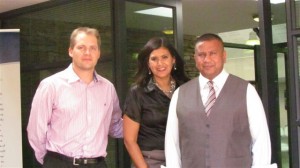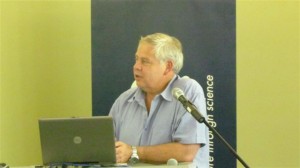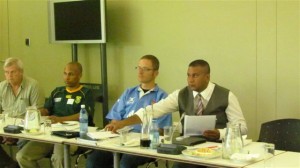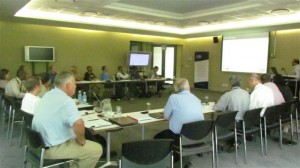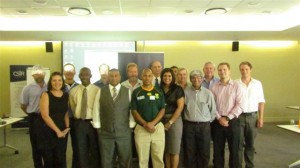On 22 February 2013 delegates from Transnet and CSIR attended a project proposals workshop at the CSIR Pretoria Knowledge Commons to identify priority projects for kick off. Ms Berenice Lue Marais from CSIR Strategic Alliances welcomed all participants in particular the Transnet partners. The strategic relationship between Transnet and the CSIR was formalised in February 2013 when the two organisations signed a Memorandum of Understanding.
Transnet and CSIR are currently working on the following areas:
- Infrastructure, including rail, port and coastal engineering, roads and buildings;
- Rolling stock, including energy efficiency, alternative fuels and energy regeneration;
- Operations – water use, waste management systems, logistics supply chain, greening, climate change, sensor tracking and automation as well as safety and security; and
- Strategic decision support which looks into planning, environmental management system and enterprise engineering.
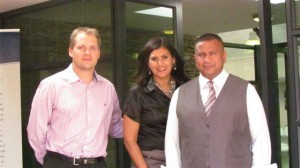
Specific projects under discussion so far with Transnet Engineering include Advanced Manufacturing Support, Production Modeling and Business Simulation, Condition Monitoring, Regenerative Braking System and, Mechanical Testing. “Since other stakeholders will be involved in project implementation, i.e. service providers and the DST, a matrix of key performance indicators should be developed for project selection, funding acceptance and approval and, assessing performance” said Sugen Govender from Transnet. For example “It would be important for Transnet to understand how the National Laser Centre at the CSIR measures its performance” Sugen added.
CSIR and Transnet will continue to pursue technical opportunities for further development. These are:
- R&D roadmap and R&D planning
- Technology assistance programme (supplier development)
- Advanced manufacturing support
- Condition monitoring of rolling stock and ICT diagnostics (telemetry to central system)
- Foundry benchmarking and foundry technology assistance
- Collaboration on mechanical testing
- Regenerative braking system (including storage devices)
- Power electronics
- Transnet production system modelling and simulation
- Pipeline infrastructure condition monitoring devices
- Electric and mechanical R&D support (future projects)
- Advanced materials/nanotechnology
Project plans for Advanced Manufacturing Support will be identified with the key individuals at Transnet. Transnet will invite CSIR to the manufacturing and refurbishing facilities to identify the critical components and then to prioritise them. Team (CSIR/Transnet) will look at volume of components and output needed to ensure correct details in the project schedule and component delivery and will agree on operational testing.
For Software Production Modeling and Business Simulation, software packages for simulation are available, but models still have to be built to meet the specific needs of the customer. CSIR will look at Airbus HUMS/CM system or existing Rail Systems to understand the current market landscape for Condition Monitoring. “Projects should be aligned to the existing technologies to build on what already exists” Commented Andries Wilken from Transnet.
The Regenerative Braking System project requires co-investment via external sources such as Parliamentary Grant and Eskom. Transnet has already looked at the landscape for locomotives and wayside systems. What will now be required is to look at energy saving devices e.g. blank canvas.
Capabilities including equipment at Transnet will be mapped to establish the complementary capability and skills needed at the CSIR for Mechanical Testing. The focus will be on rail domain testing. Transnet has approached an Indian design company that has a testing capability to advise with total testing spectrum.
Delegates proposed that the functions of the Foundries should be clearly defined and a new set of KPIs for the Foundries should be completed by April. There is need for Executive support and staff buy-in to keep meetings on track and at shorter periods. “It is important to prepare monthly reports that should be availed to all stakeholders” said Sugen Govender.
R&D facilities have been made available at the CSIR Buildings 21 and 44. The buildings will be upgraded and leased to Transnet.
It is expected that approved proposals will be turned into orders as soon as possible. Work authorisations will be approved by the CSIR/Transnet Steering Committee.

